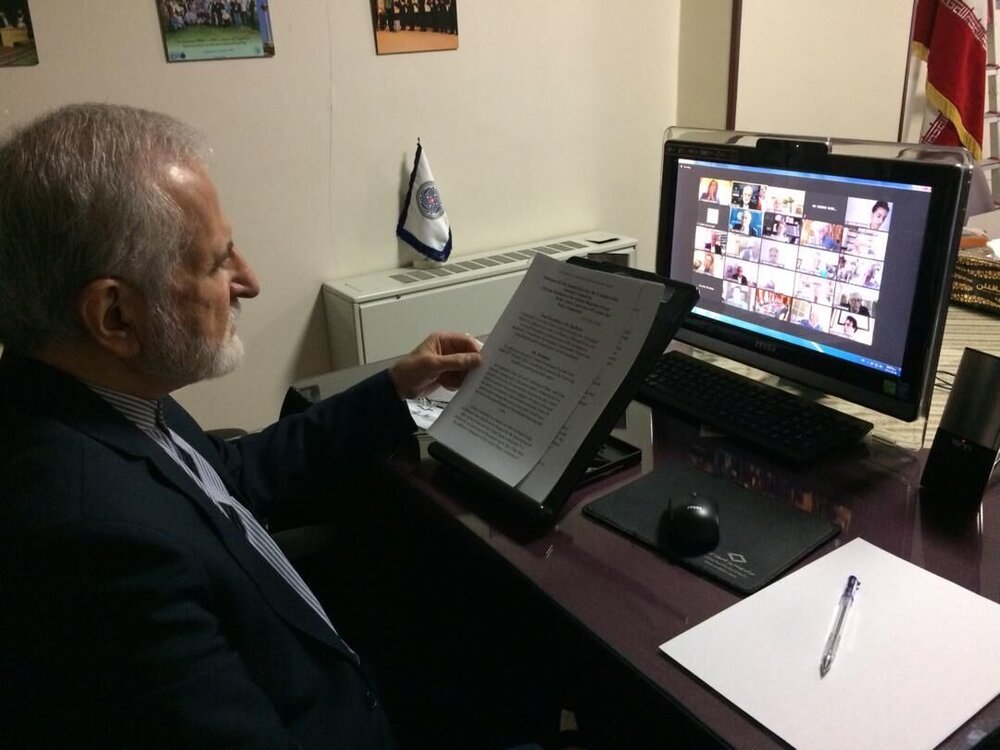Unilateralism is a lethal poison for intl. community: Kharrazi

TEHRAN - Kamal Kharrazi, chairman of Iran’s Strategic Council on Foreign Relations, said on Tuesday that unilateralism is a “lethal poison” for international community, noting the necessity of forming an “international democracy”.
“Unilateralism is a lethal poison for international community which adds to complications of the world,” Kharrazi said in an online meeting of Leaders for Peace Foundation.
The veteran politician noted that the current form of multilateralism in the world is not effective, suggesting that the international community must form an “international democracy”.
“Inefficiency of the current multilateralism is rooted in excessive demands and hegemonic inclinations of the United States’ administration which is trying to impose its unilateral approach on others,” he added.
Kharrazi also said that it is essential to form a “new system of multilateralism” and a “new international solidarity” which make the voice of all nations heard.
‘Fighting coronavirus contingent upon intl. cooperation’
Kharrazi also said that an effective fight against the coronavirus is contingent upon cooperation and solidarity at an international level.
“Secretary-General of the United Nations [Antonio Guterres] and many countries have highlighted the necessity of ending clashes and removing sanctions against countries such as Iran which has faced restrictions in providing a financial source for purchasing medicine and medical equipment,” stated Kharrazi who was Iran’s foreign minister from 1997-2005.
In a letter to the G-20 economic powers on March 24, Guterres called for rolling back international sanctions regimes around the world.
He said sanctions are heightening the health risks for millions of people and weakening the global effort to contain the spread of the new coronavirus, Foreign Policy reported.
“I am encouraging the waiving of sanctions imposed on countries to ensure access to food, essential health supplies, and COVID-19 medical support. This is the time for solidarity, not exclusion,” the UN chief said.
“Let us remember that we are only as strong as the weakest health system in our interconnected world,” the chief international diplomat said.
‘It is essential to prevent political interference in intl. bodies’
Kharrazi also said that it is essential to prevent political interference in international bodies such as the World Health Organization and International Monetary Fund.
“When the international bodies are influenced by big powers, the countries lose their trust on these bodies. For example, the International Monetary Fund has not responded to Iran’s request for loan to fight the coronavirus under the pressure of the United States,” he lamented.
Donald Trump’s administration is not only refusing to remove its illegal sanctions on Iran, but it is also blocking Tehran’s efforts to get an emergency loan from the IMF to cope with the coronavirus crisis.
Iran’s central bank wrote in March to the IMF requesting $5bn from its Rapid Financing Initiative, an emergency program that gives loans to countries facing sudden shocks such as natural disasters.
Earlier in April, the Wall Street Journal reported, citing sources from the White House, that the United States was seeking to prevent the IMF from providing loan to Iran.
Central Bank of Iran (CBI) Governor Abdolnaser Hemmati, in a post on his Instagram page on April 9, wrote, “We expect the IMF to immediately respond to the request of Iran which itself is a founding member of the fund.”
Hemmati has urged the IMF to put politics aside and do its professional duties in regard to Iran’s requests for financial aid during crises, especially in the wake of the coronavirus pandemic.
“I would like to repeat that all UN organizations say the IMF or WHO, should stay away from politics and deliver on their institutional mandates,” Hemmati said in an interview with Bloomberg published on April 19.
Government spokesperson Ali Rabiei said on April 13 that the United States has no right to prevent the IMF from giving a loan to Iran.
“From the legal point of view, the United States is not in the position to obstruct the legal performance of institutions and international organizations,” he said in a press conference.
Rabiei added, “The United States must understand that the international institutions are not its property.”
European Union foreign policy chief Joseph Borrell on April 24 criticized the U.S. for blocking Iran’s request for a loan from the IMF.
“I regret that ... the United States are opposing the International Monetary Fund to take this decision,” Borrell said during a virtual press conference at the end of a video meeting of EU foreign affairs ministers, Politico reported
“From the humanitarian point of view, this decision, this request should have been accepted.”
In an article titled, “U.S. and Iran Need a Coronavirus Peace Plan” published by Bloomberg on Thursday, U.S. Senator Dianne Feinstein wrote, “Supporting Iran’s request for $5 billion in emergency funds from the International Monetary Fund, with oversight mechanisms within or similar to the Swiss Humanitarian Trade Arrangement, to facilitate the flow of much-needed goods to the Iranian people while safeguarding against the regime’s diversion of funds for malign purposes.”
NA/PA
Leave a Comment